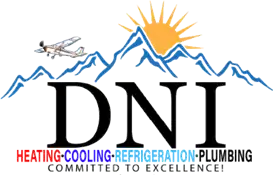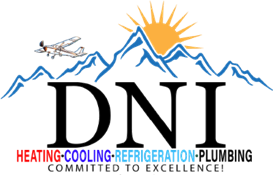
Clogged Kitchen Sink? How To Unclog Your Drain and When To Call a Professional in Longmont, CO
Living in Longmont, Colorado, means enjoying a blend of urban conveniences and natural beauty. Nestled against the Rocky Mountains, this community experiences a wide range of weather patterns, from sudden snowstorms to dry summer days. These conditions can influence everything from how we maintain our homes to how often plumbing issues arise—especially in the kitchen.
The kitchen sink is one of the most frequently used plumbing fixtures in any household, and in Longmont’s varied climate, it’s not uncommon for local residents to face occasional drain problems. Whether it’s food debris, grease buildup, or mineral-rich water contributing to blockages, a clogged kitchen sink can bring your daily routine to a standstill. Fortunately, many clogs can be resolved with a bit of know-how, and when DIY solutions aren’t enough, local experts like DNI Heating, Cooling, Refrigeration, & Plumbing, Inc. are ready to help.
Why Kitchen Sinks Clog More Often Than You Think
Understanding the Most Common Causes
Before diving into how to fix a clogged sink, it’s important to understand why clogs happen in the first place. According to the Plumbing-Heating-Cooling Contractors Association (PHCC), over 80% of all household plumbing calls are related to clogs—and the kitchen sink tops that list. Here’s why:
-
Grease and Oil: Pouring cooking grease or oil down the drain may seem harmless when it’s hot, but as it cools, it solidifies and sticks to the inside of pipes.
-
Food Scraps: Even with a garbage disposal, fibrous or starchy foods like potato peels, celery, and pasta can easily form blockages.
-
Soap Scum: Soap may seem harmless, but certain types—especially those combined with hard water minerals—create a residue that can gradually narrow your drainpipes.
-
Foreign Objects: Accidentally letting small items like bottle caps, food wrappers, or even utensils slip into the drain can cause instant clogs.
In Longmont, many homes rely on hard water from local aquifers. This water contains a high concentration of calcium and magnesium, which can leave behind deposits in your pipes, accelerating clog formation over time.
How to Unclog Your Kitchen Sink: Step-by-Step DIY Methods
1. Boiling Water Flush
One of the simplest ways to clear a light clog is by pouring boiling water directly down the drain. This method is particularly effective against grease or soap buildup.
Instructions:
-
Boil about a half-gallon of water.
-
Carefully pour it directly into the drain in stages.
-
Wait a few minutes between each pour to see if the water begins to flow more freely.
This method is not recommended for PVC pipes, which can warp under high heat.
2. Baking Soda and Vinegar Reaction
A more natural approach, the combination of baking soda and vinegar can break down organic material and reduce odors.
Instructions:
-
Pour 1/2 cup of baking soda into the drain.
-
Follow with 1/2 cup of white vinegar.
-
Cover the drain with a plug or cloth and wait 15–30 minutes.
-
Flush the drain with hot water.
This is an eco-friendly method, though it may not work on severe clogs or inorganic materials.
3. Manual Plunging
A sink plunger can help dislodge physical blockages by creating suction.
Instructions:
-
Fill the sink partially with warm water.
-
Place the plunger over the drain and plunge forcefully 10–15 times.
-
Lift the plunger and observe if the water drains. Repeat as needed.
Be sure to cover any overflow holes to create a tight seal for maximum pressure.
4. Check the P-Trap
The P-trap is the curved pipe under your sink designed to trap debris and prevent it from moving deeper into your plumbing.
Instructions:
-
Place a bucket under the trap to catch water and debris.
-
Use pliers to loosen the slip nuts and remove the P-trap.
-
Clean out any visible debris and rinse thoroughly.
-
Reassemble and test your drain.
This method is a bit more hands-on but often very effective for localized blockages.
When DIY Isn’t Enough: Signs You Need a Professional
Sometimes, a clogged drain is more than just a simple fix. In some cases, it could signal a more serious problem in your plumbing system, such as a damaged pipe, a mainline obstruction, or persistent buildup from hard water.
Warning Signs It’s Time to Call a Professional:
-
Multiple Clogged Fixtures: If more than one drain in your home is backed up, the issue could be in your main sewer line.
-
Slow Drainage Despite DIY Attempts: Persistent clogs may require specialized tools, like a hydro-jetter or plumber’s snake, to clear thoroughly.
-
Foul Odors: If you notice strong, persistent odors coming from the drain, it could be due to decaying organic matter or sewer gas leaks.
-
Recurring Clogs: If your sink keeps clogging even after you clear it, this might be due to a more complex issue in the pipe system or buildup deep in the plumbing.
-
Unusual Noises: Gurgling or bubbling sounds could indicate trapped air from a blockage or broken vent pipe.
Hiring a professional plumber ensures that the problem is diagnosed accurately and fixed correctly the first time—saving you time, money, and frustration.
How Professional Plumbers Tackle Stubborn Sink Clogs
At DNI Heating, Cooling, Refrigeration, & Plumbing, Inc., our licensed plumbers use advanced diagnostic tools to determine the exact cause of your sink clog. We’re equipped to handle everything from simple kitchen drain cleaning to comprehensive pipe inspections using camera technology.
Some of the Services We Provide Include:
-
Drain Snaking: A powerful auger tool is inserted into the drain to break up clogs and retrieve solid obstructions.
-
Hydro Jetting: High-pressure water jets clear grease, soap scum, and mineral deposits from pipes, restoring full flow.
-
Pipe Repairs and Replacements: In cases where the pipe is cracked or corroded, we offer quick and effective repairs.
-
Preventative Maintenance: Regular drain cleaning services help prevent future clogs and extend the life of your plumbing system.
We also offer maintenance plans to help homeowners in Longmont stay ahead of plumbing issues year-round—especially helpful given the mineral content in local water that can contribute to buildup.
Long-Term Solutions and Prevention Tips
Preventing future clogs starts with awareness and simple habit changes. Here’s how to keep your kitchen sink running smoothly:
-
Don’t Pour Grease Down the Drain: Instead, collect it in a container and dispose of it in the trash.
-
Use a Drain Strainer: These inexpensive tools catch food particles and other debris before they go down the drain.
-
Run Hot Water After Each Use: This helps clear light residues before they can harden or build up.
-
Limit Garbage Disposal Use: Even powerful disposals can’t handle everything. Avoid putting fibrous, starchy, or hard materials down your disposal.
-
Schedule Annual Drain Cleaning: Regular professional cleanings help prevent buildup and catch issues early.
According to the Environmental Protection Agency (EPA), proper drain maintenance can reduce plumbing failures by up to 65%, significantly extending the lifespan of your plumbing system.
For Plumbing Services in Longmont, CO, Contact DNI Heating, Cooling, Refrigeration, & Plumbing, Inc. Today
A clogged kitchen sink can feel overwhelming, especially when you’ve tried all the tricks and the water still won’t budge. That’s where we come in. At DNI Heating, Cooling, Refrigeration, & Plumbing, Inc., we combine local experience with state-of-the-art technology to deliver prompt, effective plumbing solutions you can trust.
We understand the plumbing needs unique to Longmont homes—from hard water issues to weather-related wear and tear—and we’re committed to delivering professional, reliable service every time. Whether it’s an emergency drain cleaning or a full plumbing inspection, our team is ready to help.
Call us today to schedule an appointment or learn more about our plumbing services. Let’s keep your kitchen running smoothly—clog-free and stress-free.

